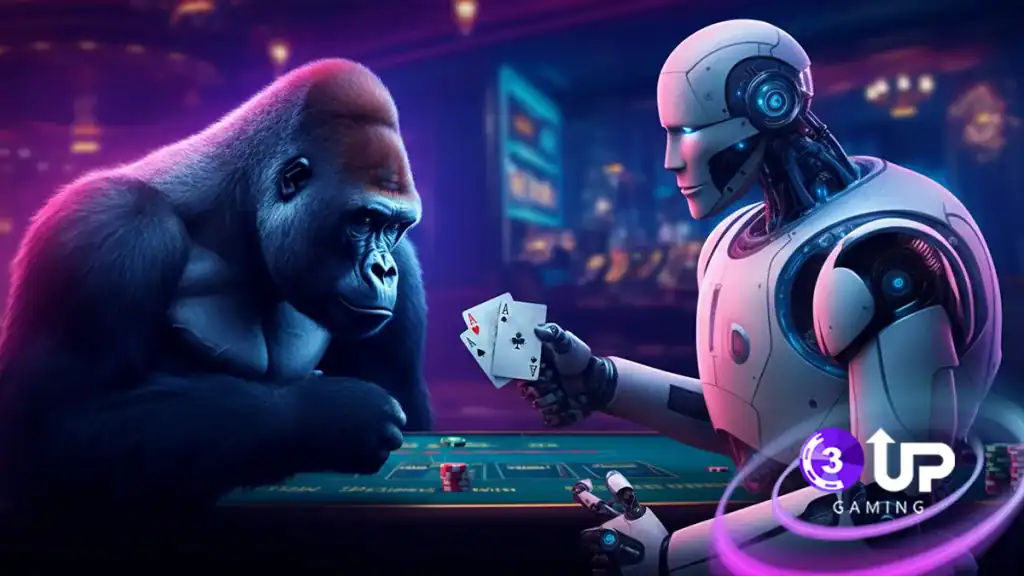AI Texas Hold’em: How Artificial Intelligence Is Transforming Poker! What Happens When Machines Learn to Bluff? Can a machine really bluff better than a human? Could an algorithm pick up on betting patterns the way a seasoned pro does? And are we heading toward a future where AI takes over Texas Hold ’em the same way it mastered chess and Go?
These aren’t just fun “what if” questions anymore; they’re real challenges being tackled right now in the world of Artificial Intelligence Poker.
AI is changing the way Texas Hold ’em is played, studied, and even enjoyed. From weekend hobbyists to high-stakes professionals, everyone is starting to feel the ripple effects.
In this article, we’ll explain how AI Texas Hold’em is evolving? Why does it matter? and what the future of poker might look like in an AI-driven world?
If you’re curious about just how far poker AI has already come and how it’s shaping the tools and strategies players use today, we recommend checking out this detailed guide from 3UP Gaming. It’s the perfect companion read to go deeper into the themes we’re exploring here.
How Artificial Intelligence Plays Texas Hold’em
First let me explain how AI is used in poker.Unlike board games with complete visibility (like chess), poker is a game of imperfect information. That makes it more complicated. AI systems must make decisions without knowing all the variables, much like humans.
AI techniques Texas Hold’em using a mix of reinforcement learning, deep learning, and game theory. Algorithms are trained on billions of hands, learning to make probabilistic decisions, spot patterns, and adjust strategies in real time. Instead of relying on tells, AI uses pure data and logic to optimize its plays.

The most notable AI poker breakthrough came from Carnegie Mellon University’s “Libratus” in 2017. It defeated elite real players in heads-up no-limit Texas Hold’em over 120,000 hands. It didn’t just win, it dominated. Since then, the field has exploded.
Today, new models like Pluribus and other proprietary engines continue to redefine the standards. These systems run simulations on vast databases, constantly evolving. They play against themselves millions of times and adjust without human help. The result? AI Texas Hold ’em that can go toe-to-toe with the world’s best.
AI has learned to bluff, slow play, trap, and execute advanced poker concepts not by watching humans, but by optimizing outcomes over time. This is the essence of Artificial Intelligence Poker ruthlessly efficient, deeply calculated, and shockingly effective.
GTO Solvers and Their Role in AI Poker
A big part of AI’s strength in poker comes from something called GTO, Game Theory Optimal.
GTO solvers are tools that help players and AI find the perfect strategy in any given situation. They don’t rely on reading or psychology. Instead, they create balanced strategies that are mathematically difficult to exploit.
GTO Poker AI operates by computing optimal plays for different hand ranges and positions. For humans, solving even a single poker spot can take hours. For an AI running on high-performance hardware, it’s near-instantaneous.
GTO solvers are used to:
- Avoid patterns that can be exploited
- Create mixed strategies to confuse opponents
- Understand the expected value (EV) of different plays
- Simulate long-term profitability against any type of opponent
This tech isn’t just for bots. Pros like Fedor Holz and Justin Bonomo have spoken openly about how they use GTO solvers to train. They input past hands and find leaks they didn’t know they had. This is where GTO Poker AI meets human discipline.
We’re in an age where “study time” often means sitting with solvers, not coaches. And as AI Poker Tools become more accessible, even mid-level players can improve with techniques once reserved for the elite.

Advantages of AI Poker Over Traditional Play
AI Poker never tilts. It doesn’t get weary; it doesn’t bluff emotionally and never chases bad beats. Just these few things alone demand much greater advantage over human players.
Some of the advantages included here:
Stamina
No AI gets weary. It can go on hands for millions, with hands being battled consecutively, maintaining the same sharp mental focus as when it started the first game, till it plays its last hand.
Accuracy
Unlike human beings toying with guesswork, it knows how to compute the odds and consider all possibilities with perfect accuracy so that every action it takes is genuinely in accordance with ideal math.
Read More: Guide to Using a Poker Strategy AI Bot for Online Poker
Adaptability
The AI reacts rapidly to changing opponent behaviors and adjusts its own strategy to remain ahead throughout advanced learning.
Immunity to Emotion
The ego, fear, or greed never clouds its judgment. Every move it ever makes is pure logic instead of the disgusted emotions that real players go through.
Scalability
Scale-wise, one AI could analyze vast numbers of games all at the same time, providing insight and performance levels beyond the limits of any single human being.
An AI doesn’t suffer from variance the way real players do. It takes a high-EV decision every time, whereas real players tilt, misclick, or let their personal biases affect their decisions.
Imagine a poker player who never forgets a hand, can never doubt a decision, and can, in milliseconds, simulate each and every possible line.
That is what the Texas Hold’em AI strategy delivers. And it is not just an abstract power. Genuine AI Poker Software for Players does exist. Be it analyzing hands after a game or suggesting decisions during study, AI is fast becoming a staple kit of competing.
AI Poker Tools for Players and Developers
AI has transformed the play and development of Texas Hold ’em. What used to be a domain that only elite professionals owned is now open to anyone interested in exploring. With this tech at hand, players also have a chance to review individual hands, experiment with their game, and even go over GTO training in interactive sessions. Some of which are very popular include:
- PioSOLVER: A professional-grade solver that breaks down hands with great precision in GTO analysis. PokerSnowie: A neural network-based training tool for cash game simulations and post-game reviews.
- GTO+: A better economic choice for those who wish to study the GTO strategy, which is also very popular among mid-stakes grinders.
- SimplePostflop: Known for research in the area of multi-street hand trees and equilibrium solutions.
- Equilab: A tool for practice, which is used in the development of ranges and calculation of equities, and is also commonly used with solvers.
These tools’ power is in their ability to process thousands of hands at the same time. They also do well in breaking down decisions, identifying leaks, understanding the competition’s range of play, and they take practice into efficient improvements for online and live games.
And in the same way that players benefit, developers are using these platforms as bases to develop better training bots, AI-powered coaching assistants, and interactive simulations for poker education.
Also, many poker platforms are embedding AI right into their software, which in turn makes the experience more dynamic and user-friendly. AI in poker has transformed the game’s play and also how it is studied and taught. As tech continues to advance, we are only at the beginning of what to expect in the field of poker strategy and AI development.
Human vs AI: Can Players Still Win?
Do players still win? Here’s the million-dollar question!
Is a human out there that can still defeat AI in Texas Hold’em? In some, it does. In others, it doesn’t. AI rules in heads-up play and short-handed games, which have small decision trees and are well-suited to GTO strategies. In full ring games or in live unpredictable settings, however, humans can still come out on top if they use AI tools.

In the Human vs AI Poker war of skill, the lines between us and them blur. Many top players today use AI for training purposes; they don’t view AI as an enemy but as a coach. The goal isn’t to outdo the machines but to use them as a learning tool.
AI may know the math, but we bring to the table creativity, timing, and emotional intelligence. Some live players outperform the machine at telltale signs, misdirection, and social pressure, which AI is still far from achieving. In short, what we see is that Humans can still come out on top, also in dynamic environments. But the past where we won games by gut feel? Those days are over.
Future of AI in Texas Hold ’em and Online Poker
The future of AI in Poker is bigger than just better bots. Expect major transformations in how poker platforms operate:
- AI-driven coaching: Real-time strategy suggestions during play.
- More intelligent matchmaking: Pairing players with similarly skilled opponents using AI tracking.
- Advanced game security: Using AI to detect cheating and bot use.
- Immersive poker experiences: Blending AI with VR or AR environments.
- Custom gameplay simulations: For players to replicate tournaments or study leaks.
We’re talking about poker 2.0games that are more personalized, secure, and optimized than ever. The future of AI in Texas Hold ’em will include: On-the-fly analysis engines built into apps, AI-powered HUDs (Heads-Up Displays) that provide live opponent data, and Poker rooms that adjust dynamically to each player’s style.
For casual players, this means more innovative tools and better protection. For pros, it means the learning curve never stops. And for developers? There’s never been a better time to innovate.
Ethics and Fair Play in AI-Driven Poker
As the field of AI grows within poker we see that it is to adhere to ethical standards and fair play is of great importance. Unequal Access, real-time assistance during play, and the issue of unregulated bots. These elements put at risk the integrity of both online and live poker. The issues related to fair play in AI Poker are:
Transparency Poker sites must present what is accepted in terms of AI use to all players.
Regulation-enforced rules that do away with real-time solver use in games, which in turn helps to level the playing field.
Detection and Enforcement. Ongoing investment in tech for detection is key to identifying which human players are using AI bots and to punish those who do.
Equal Access. As technology in AI Poker Software for Players improves, we see a greater need for these tools to be made available in an ethical and fair way to a large number of players instead of a chosen few.
Ethics in poker during the AI age is a matter of partnership between developers, platforms, and players. Developers are to put in place protective measures. Operators run their ecosystems with integrity.
And players adopt a code of conduct which respects the game’s spirit. If these pieces fall into place, AI can be a force for good, a tool that raises skill, sharpens competition, and improves the poker experience instead of detracting from it.
AI Texas Hold ’em has redefined what it means to play smart, to study hard, and to compete at the highest levels. What began as a research experiment has evolved into a mainstream revolution that’s reshaping the game from the inside out. Artificial Intelligence Poker is not just influencing how we play, it’s changing how we think about strategy, risk, and competition.
While some may see the rise of GTO Poker AI as a threat to tradition, others see it as a powerful tool, one that makes the game deeper, fairer, and more competitive. Whether you’re a weekend warrior or a seasoned grinder, AI Poker Tools now offer a roadmap to real improvement.
Read More: Understanding Poker vs AI Bots: What Every Player Should Know
And while AI may dominate in many technical aspects, poker is still a game of people. A game of psychology, timing, and nerve. Until the day comes when a bot can sit at a live table and make a joke, throw a chip, and read a room, humans still have their place at the felt.
So the question isn’t whether AI is changing poker. It’s whether you’re ready to evolve with it. Because the future of AI in Poker isn’t coming, it’s already here.
Faq: AI Texas Hold’em
1. How does AI play Texas Hold’em poker?
AI plays Texas Hold ’em through probability analysis, calculating GTO strategies with a machine learning approach to modifying its play based on outcomes and opponent patterns. In other words, AI never considers emotion, psyche, or physical tells-it’s solely data-driven.
2. Can AI consistently beat human players in Texas Hold ’em?
Indeed it can, more so in head-up or short-handed forms. AI has exhibited its capability to outperform some of the best professionals when it adopts GTO-based strategies. Thus, still, human intuition comes into play in bigger games or uncontrolled live situations.
What role do GTO solvers play in AI poker strategies? GTO solvers are the core on which AI poker strategies are built today. They compute by hand the most balanced and least exploitable moves in any situation. From the millions of situations they compute, the AI not only trains but develops a strategy it deploys in play.
3. Are AI poker tools available for regular online players?
Yes. PioSOLVER, PokerSnowie, GTO+, amongst other such tools, are for players wanting to analyze their game and learn about the best strategies for improvement with the insight of AI.
4. How is AI changing the future of online poker rooms?
Online poker rooms face AI-assistance in detecting bots and cheating, providing coaching tailored to a player, matchmaking, and enhancing user experience. This translates into a more innovative, secure, and engaging environment for all.


